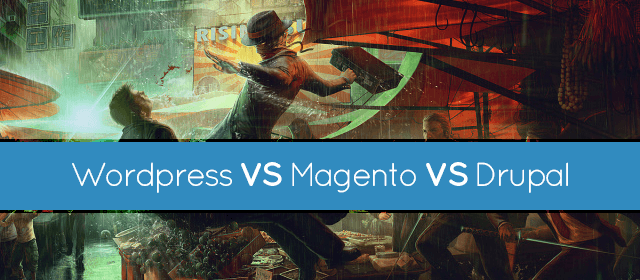Developing a website solely depends on your objectives and the business requirements, therefore, choosing the perfect platform is imperative for steering your business in the right direction.
The debate concerning which platform is better has been going on for quite some time but, nonetheless, the conclusion remains the same. Web development is the ideal way to escalate your business only when chosen the right path. We have various Content Management System (CMS) to choose from and start the development with. To help you decide and clearing all your doubts, we’ve dwindled it down to three most popular Content Management System i.e. WordPress, Drupal and Magento.
To make things simpler, we have laid out all the plus points and downside of these three platforms so that you’d be able to choose a reliable platform, though it depends on the specific business needs.
WordPress:
Indubitably, WordPress is the most popular CMS because of its rich features. When it was launched, it was merely a blogging platform but soon gained popularity and is now the one of the best website development platforms. It hosts multiple authors and includes a huge plugin library. You don’t have to worry about the SEO capabilities as it has a myriad of plugins that are on the go services.
Let’s have a look at some of the facts:
– WordPress has been downloaded more than 160 million times.
– WordPress powers almost 23% of the internet websites.
– More than 75 million sites depend on it.
– It has more than 45,000 plugins.
– WordPress related keywords score 37 million searches per month.
Its simplicity and ease of using are what makes it popular as you don’t need any technical expertise for using it. You can easily create a site, start adding content, customize themes, add plugins and start running your website.
It doesn’t matter if you belong to a technical background or not. It is easy to use that you need to have only basic understanding of HTML, PHP and CSS. But it has a downside too, its security. Being the most popular CMS, it is often prone to cyber attacks and is often a target for hackers. Also, sometimes, when the site is updated it doesn’t support old plugins and limits the design options too.
Some sites that run on WordPress:
BBC America, SONY, MTV, TechCrunch, The New Yorker, eBay Inc etc.
Drupal:
It was launched in 2001 and like other Content Management Systems is too, based on MySQL and PHP and is also popular due to its rich features. It is extremely powerful and flexible for blogging and enterprise systems and also for backend systems. It is quite flexible with developers for developing websites as it is enterprise and search engine friendly with exceptional features as it enables developers to handle hundreds of thousands of web pages with ease. You can easily hundreds of users simultaneously.
– it is ideal for creating large scale websites.
– It is simple to use with convenient customization.
– If you are only into Content Marketing, then there is nothing a better option than Drupal.
It is ideal for developing complex sites that require some advanced functionality and for developing an integrated digital framework. Before using it, you need to be familiar with the programming languages and must possess technical expertise and experience to operate it. Also, it does have a steep learning curve and doesn’t have free plugins and themes. It has reliable features like easy content authoring, good performance and good security but its module flexibility is what you should go for as it lets you build a well-organized and structured site.
Some sites that run on Drupal:
BBC, NBC, MTV UK, University Oxford, Disney etc.
Magento:
Magento was released in 2008 and is an open source e-commerce platform powering business whether it is small scale or huge international chains. As of March 2015, its market share is approx 29.8% as there are 502,666 websites that run on it out of which 251,825 are live sites. It is perfect for developing e-commerce sites as these sites have lots of pages and it is quite difficult to manage and control all the pages simultaneously but with Magento, it is easy because of its ability to manage and control all the web pages through single admin control.
Magento development is the new business strategy as it assists you in developing complex sites. It comes with built-in SEO features to ensure that your site remains at the top of the search engines.
Some of its features:
– Easy to customize and customer segmentation.
– Built-in SEO functionality.
– More stable and secure platform.
– Offers other functionality like detailed analysis report, mobile compatible payment, product management and so on.
– Sorting of products is easy.
Some sites that run on Magento:
Coca-Cola, BevMo, Nestle, Burger King and much more.
But which one to pick?
All the three platform provide a framework that can be used for developing websites and as I have said it n number of times that choosing a platform depends on your objectives and business needs.
For small scale sites, WordPress is fine and for content marketing Drupal is good and if you want to have complex sites like e-commerce, then go for Magento. Just remember that your goals and business requirements are what that define your site.
